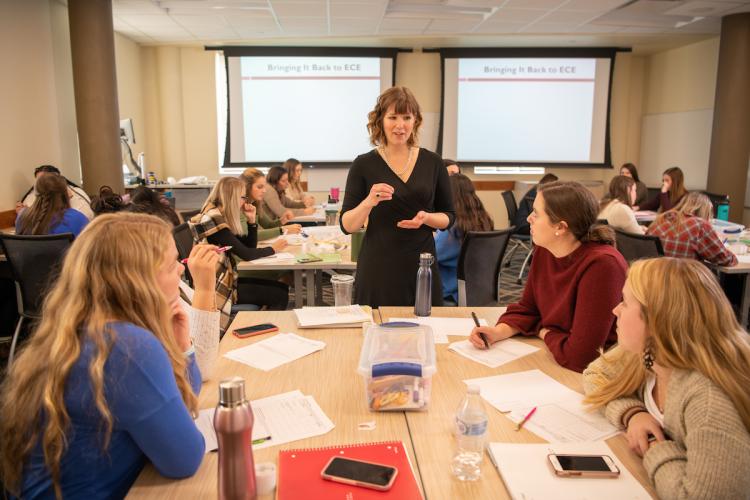
Patton College of Education faculty use mathematics and problem-solving to connect data to the world

In their classrooms, educators Courtney Koestler and Matt Felton-Koestler don’t only ask their students to solve math problems like, “If Sam has four red apples and Jordan has three green apples, how many apples do they have together?”
Instead, the two often offer up problem-solving questions connecting math to real-world topics, current events, and societal issues relevant to their students’ lives. Through their teaching methods, they are making elementary mathematics more meaningful and applicable inside and outside the classroom.
“It's important for people to understand, analyze, and critique the world around them. By looking at real-world data, they can use mathematics as a tool to do just that,” Koestler said.
Depending on students’ ages and interests, they might use mathematics to understand environmental changes, calculate whether a minimum wage job can support a family, or analyze our country’s changing demographics.
Recently, Koestler, director of the OHIO Center of Equity in Mathematics and Science, and Felton-Koestler, associate professor in the department of Teacher Education, have also published two new books written for upper elementary and middle school children titled “Data In Your World – Exploring Our Schools” and “Data In Your World – Communities Near and Far.” The books draw on their experiences and expertise as educators and education researchers that seek to support school children in connecting data to the real world, developing critical literacy, and using mathematics as a tool to understand inequities and injustice.
“I have always wanted to write children’s books to explore math in meaningful ways,” Koestler said. “Working with Wendy Vincent at Carson Dellosa was an excellent experience. She was interested in developing books that supported kids in using data to learn about diversity and equity in ways that most texts in classrooms don’t. I’m excited for kids and teachers to be able to use these books.”
The books are already getting glowing reviews in publications such as School Library Journal and Booklist online. The Booklist review calls “Communities Near and Far” “refreshing and much-needed” and calls attention to the important content in the book, including the discussions of racial diversity, housing segregation, red-lining, and other important topics.
“I’m excited that we were able to include some topics, like redlining that show how data can be a tool for understanding injustice,” Felton-Koestler said. “While I know I still have more to learn about this, it was an exciting and new challenge for me to think about how to communicate with a middle-grades audience about these ideas in a book that may get picked up and used in a variety of ways.”
The two educators have also been awarded a collaborative research grant titled “Connecting Elementary Mathematics Teaching to Real-World Issues” from the National Science Foundation where they will put these ways of teaching into practice, collaborating with teachers in the public schools in the area.
The three-year project will allow for the educators to recruit and work closely with local teachers to develop, design, and pilot lessons and tasks with these teaching methods, embedding them into classrooms in the following years.
